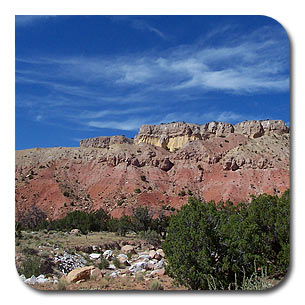QIP 2009
The Twelfth Workshop on
Quantum Information Processing
January 12-16, 2009
Home | Photos | Submissions | Posters | Program | Talks | Dates | Committees
Participants | Location | Area Activities | Travel | Previous QIPs | Support

QIP 2009 will be held in historic downtown Santa Fe, New Mexico, USA
Fifteen years ago, Shor's efficient quantum algorithms for factoring integers and evaluating discrete logarithms launched the field of quantum information processing (QIP) into the public consciousness. QIP is now one of the most active and fastest-growing research areas in computer science and physics, spanning topics such as quantum computation, quantum communication, and quantum cryptography. QIP 2009 is the twelfth in a series of international workshops dedicated to disseminating recent theoretical advances in this field.
Photos page - with group photos!
Talks (in order of presentation)
- Andrew Landahl
Opening remarks (Slides: PDF)
- Matt Hastings (invited)
A counterexample to additivity (Slides: PDF)
- Patrick Hayden and Andreas Winter
The fidelity alternative and quantum measurement simulation (Slides: PDF)
- Sergey Bravyi and Barbara Terhal
A no-go theorem for a two-dimensional self-correcting quantum memory based on stabilizer codes (Slides: PDF | PPT)
- Dmitry Gavinsky
Predictive quantum learning (Slides: PDF)
- Graeme Smith (invited)
Quantum communication with zero-capacity channels (Slides: PDF)
(Joint work with Yard.)
- John Smolin and Graeme Smith
Can non-private channels transmit quantum information? (Slides: PDF | PPT)
- Ashley Montanaro and Tobias Osborne
Quantum Boolean functions (Slides: PDF)
- Yi-Kai Liu
Quantum algorithms using the curvelet transform (Slides: PDF)
- Dave Bacon, Wim van Dam and Alexander Russell
Analyzing quantum circuits using the least action principle (Slides: PDF)
- Avinatan Hassidim (invited)
Multi-prover interactive proofs with communicating provers (Slides: PPT)
(Joint work with Michael Ben-Or and Haran Pilpel.)
- Andris Ambainis
Quantum algorithms are at most polynomially faster than classical for any symmetric function (Slides: PPT)
- Jean-Pierre Tillich
Quantum tornado codes
- Norbert Schuch and Frank Verstraete
Interacting electrons, density functional theory, and quantum Merlin-Arthur (Slides: PDF)
- Andrew Childs (invited)
Universal computation by quantum walk (Slides: PDF)
- Dmitry Gavinsky
Classical interaction cannot replace quantum nonlocality (Slides: PDF)
- Richard Cleve, Daniel Gottesman, Michele Mosca, Rolando Somma and David Yonge-Mallo
Efficient discrete-time simulations of continuous-time quantum query algorithms (Slides: PPT)
- Tsuyoshi Ito, Hirotada Kobayashi and Keiji Matsumoto
Oracularization and two-prover one-round interactive proofs against nonlocal strategies (Slides: PDF | PPTX)
- Panos Aliferis and John Preskill
Fault-tolerant quantum computing against highly biased noise (Slides: PPT)
- Bryan Eastin and Emanuel Knill
Restrictions on transversal encoded quantum gate sets (Slides: PDF)
- Avraham Ben-Aroya and Amnon Ta-Shma
Approximate quantum error correction for correlated noise (Slides: PPT)
- Dmitry Maslov
Quantum information funding at the National Science Foundation
- Charles Marcus (invited)
Holding quantum information in electron spins
- Sandy Irani
Ground states entanglement in one-dimensional translationally-invariant quantum systems (Slides: PDF | PPT)
- Fernando Brandao and Martin Plenio
Quantum Stein's lemma for correlated states and asymptotic entanglement transformations (Slides: PPT)
- Steve Flammia, David Gross, Jens Eisert, Michael Bremner, Andreas Winter and Caterina Mora
Most quantum states are useless for measurement-based quantum computation (Slides: PDF)
- Matt Hastings (invited)
Area laws for quantum many-body systems: Gapped one-dimensional systems are in NP (Slides: PDF)
- Norbert Schuch, J. Ignacio Cirac and Frank Verstraete
The computational difficulty of finding MPS ground states (Slides: PDF)
- Dan Shepherd and Michael Bremner
Instantaneous quantum computation (Slides: PDF)
- Jens Eisert and David Gross
Lieb-Robinson bounds and "supersonic quantum communication" (Slides: PDF)
- Scott Aaronson and John Watrous
Closed timelike curves make quantum and classical computing equivalent (Slides: PPT)
- Lluis Masanes (invited)
Device-independent security in QKD (Slides: PPT)
- Amnon Ta-Shma
Short seed extractors against quantum storage (Slides: PPT)
- Jop Briet, Harry Buhrman and Ben Toner
A generalized Grothendieck inequality and entanglement in XOR games (Slides: PDF)
- Dejan Dukaric, Manuel Forster, Severin Winkler and Stefan Wolf
On non-locality distillation (Slides: PDF)
- Gilles Brassard, Louis Salvail and Alain Tapp
Key distribution and oblivious transfer à la Merkle (Slides: PDF)
- Robert Koenig, Renato Renner and Christian Schaffner
The operational meaning of min- and max-entropy (Slides: PPTX)
- Matthias Christandl, Dejan Dukaric, Robert Koenig, and Renato Renner
Postselection-technique with applications to quantum cryptography and the parallel repetition problem (Slides: PDF)
- Robert Koenig, Ben Reichardt and Guifre Vidal
Exact entanglement renormalization for string-net models (Slides: PDF)
- Aram Harrow and Richard Low
Efficient quantum tensor product expanders and k-designs (Slides: PDF)
- Bill Rosgen
Distinguishability of random unitary channels (Slides: PDF)
Videos for talks coming soon.
Last Updated February 11th, 2009.
Home | Photos | Submissions | Posters | Program | Talks | Dates | Committees
Participants | Location | Area Activities | Travel | Previous QIPs | Support